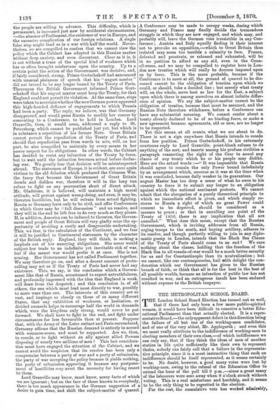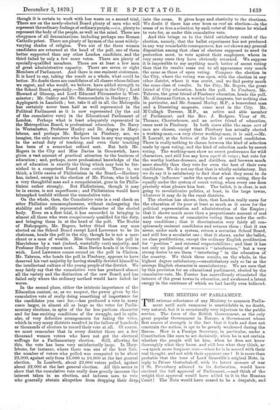THE METROPOLITAN SCHOOL BOARD.
THE London School Board Election has turned out so well, that if there had only been a few more public-spirited. women, it would have been difficult to conceive a better Edu- cational Parliament than that actually elected. It is a repre- sentative Board,—the only apparent defect in this direction being the failure of all but one of the working-men candidates, and of one of the very ablest, Mr. Applegarth ; and even this we must really attribute to the indifference of working-men to electing members of their own class,—of which indifference we can only say, that if they think the ideas of men of another station in life quite sufficiently like their own to represent theirs, nobody can fairly call that a failure in the representa- tive principle, since it is a most instructive thing that such an indifference should be itself represented, as it seems certainly to be. No doubt, however, a good many votes were lost by working-men, owing to the refusal of the Education Office to extend the hour of the poll till 9 p.m.,—since a great many of the labourers were sent away when 8 o'clock struck without voting. This is a real misfortune and hardship, and it seems to be the only thing to be regretted in the election. For the rest, the cumulative vote has worked admirably,
though it is certain to work with less waste on a second trial, There are on the newly-elected Board plenty of men who will represent the ordinary feelings of ordinary people,—i.e., plenty to represent the body of the people, as well as the mind. There are clergymen of all denominations, including perhaps one Roman Catholic priest. There are plenty of laymen of the most widely- varying shades of religion. Two out of the three women candidates are returned at the head of the poll, one of them better supported than any other London candidate, and the third failed by only a few score votes. There are plenty of specially-qualified members. There are at least a few men of great administrative capacity. There are seven or eight Members of Parliament. And there is one eminent statesman. It is hard to say, taking the result as a whole, what could be better. No doubt there are candidates of all classes whose failure we regret, and who would, we believe, have added strength to the School Board, especially,—Mr. Hastings in the City ; Lord Howard of Glossop, and Lord Edmund Fitzmanrice in West- minster; Mr. Oakley and Mr. Sonnenschein in Hackney; Mr. Applegarth in Lambeth ; but, take it all in all, the Metropolis has certainly never been half as well represented in the Political Parliament as it is now represented (by the aid of the cumulative vote) in the Educational Parliament of London. Perhaps what is least adequately represented in the Metropolitan Board, is professional education. Dr. Barry in Westminster, Professor Huxley and Dr. Angus in Mary- lebone, and perhaps Mr. Rodgers in Finsbury, are, we imagine, the only members who have been in any way engaged in the actual duty of teaching, and even their teaching has been of a somewhat refined sort. But both Mr. Rogers in the City and Miss Davies in Greenwich, have given a vast amount of practical attention to the business of education ; and, perhaps, mere professional knowledge of the art of education is exactly the thing which may beat be fur- nished to a competent Board from outside. There is, we think, a little excess of Philistinism in the Board,—Hackney has, indeed, except in the election of Mr. Picton, who is both a very thoughtful man and a compulsionist, gone in for Philis- tinism rather strongly. But Philistinism, though it may be in excess, is not superfluous ; and Philistinism would have triumphed tenfold without the cumulative vote.
On the whole, then, the Cumulative vote is a real check on utter Philistine commonplaceness, without endangering the stability and solidly representative character of the elected body. Even on a first trial, it has succeeded in bringing in almost all those who were conspicuously qualified for the duty, and bringing them in at the head of the poll. The Rector of Bishopsgate, Mr. Rogers, better fitted than any man elected on the School Board except Lord Lawrence to be its chairman, heads the poll in the city, though he is not a mer- chant or a man of wealth. Miss Garrett heads the poll in Marylebone by a vast (indeed, wastefully vast) majority, and Professor Huxley comes next. Miss Davies heads it in Green- wich. Lord Lawrence comes second on the poll in Chelsea. Mr. Tabrum, who heads the poll in Finsbury, appears to have deserved his vast majority by having steadily devoted himself to the intellectual culture of the young people of the district. We may fairly say that the cumulative vote has produced- almost all the variety and the distinction of the new Board, and has failed only where the ordinary method would have failed far worse.
In the second place, either the intrinsic importance of the Education contest, or, as we suspect, the power given by the cumulative vote of really doing something of importance for the candidates you care for,—has produced a vote in many cases larger, in almost all as large as the votes for Parlia- mentary elections, in spite of the far less partizan character and far less exciting conditions of the struggle, and in spite, also, of very defective arrangements for taking the votes, which in very many districts resulted in the failure of hundreds or thousands of electors to record their vote at all. Of course, we must remember that in every district there are a few thousand women voters who have not got the electoral suffrage for a Parliamentary election. Still, allowing for this, the vote has been very satisfactorily large. In Mary- lebone, for instance, where there was one of the best lists, the number of voters who polled was computed to be about 23,000, against only from 15,000 to 16,000 at the last general election. In Lambeth, about 23,000 voters polled, against about 22,000 at the last general election. All this seems to show that the cumulative vote really does greatly increase the interest taken in an election, and induces men to vote who generally abstain altogether from dropping their dro into the ocean. It gives hope and elasticity to the elections. We doubt if there has ever been so real an election—in the sense of so free a selection by each voter of the name he wished to vote for, as under this cumulative vote.
And this brings us to the third satisfactory result of the election, namely, that the ballot experiment has not produced in any way remarkable consequences, has not shown any general disposition among that class of electors supposed to need its protection most, to vote against their employers, whom in very many cases they have obviously returned. We suppose it is impossible to say anything much better of secret voting than that its results came out to all appearance very much the same as those of open voting. Compare the election in the City, where the voting was open, with the election in any other district, where it was secret, and we find pretty much the same class of results. In the City, Mr. Rogers, the great. friend of City education, heads the poll. In Finsbury, Mr. Tabrum, the great friend of Finsbury education, heads the poll. Mr. Alderman Cotton, a worthy local magnate, but nothing else in particular, and Mr. Samuel Morley, M.P., a benevolent man and a Dissenting magnate, came next in the City. Mr. M'Cullagh Torrens, M.P., an active and able member of Parliament, and the Rev. J. Rodgers, Vicar of St. Thomas, Charterhouse, and an active friend of education, came next in Finsbury. In both cases alike the same sort of men are chosen, except that Finsbury has actually elected a working-man,—a very clever working-man, it is said,—Mr. B. Lucraft, at the bottom of the list of returned candidates. There is really nothing to choose between the kind of selection made by open voting, and the kind of selection made by secret. voting. The working-men show no secret preferences for wild characters, and still less any keen esprit de corps; but vote for the worthy leather-dressers, and distillers, and brewers much- more steadily than they vote for even the best of their own candidates. We do not say that that is wholly satisfactory. But we do say it is satisfactory to find that what they seem to do through influence' under the system of open voting, they do equally under the system of secret voting, when every one does precisely what pleases him best. The ballot, it is clear, is not going to revolutionize politics, at least, in the large towns, whatever it may do in the rural districts.
The election has shown, then, that London really cares for the education of its poor at least as much as it cares for- the political representation and administration of the Empire ; that it shows much more than a proportionate amount of zeal under the system of cumulative voting than under the ordi- nary conditions ; that it discriminates very fairly all con- spicuously eminent candidates and returns them ; that it can never, under such a system, return a sectarian School Board,. and still less a secularist one ; that it shows, under the ballot, no class predilections, except the ordinary English predilection for "position " and external respectabilities ; and that it has - not only no jealousy of women's " interference," but a -very strong desire to see them " interfering " in the education of the country. We think these results, on the whole, in the highest degree satisfactory,—unsatisfactory only so far as the average English character is unsatisfactory. We are sure that by this provision for an educational parliament, elected by the cumulative vote, Mr. Forster has marvellously stimulated the interest of the great towns in education, and awakened a latent energy in the existence of which we had hardly even believed.



































 Previous page
Previous page